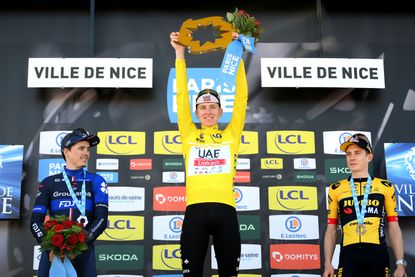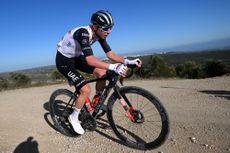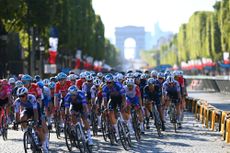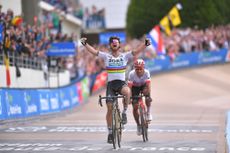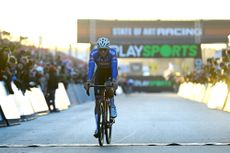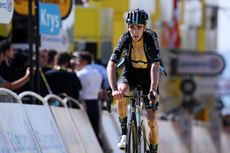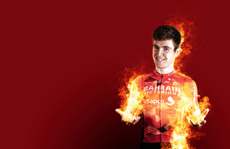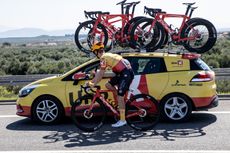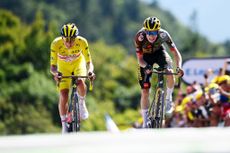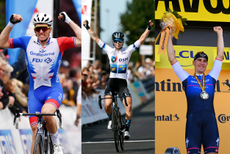Tour de France
Tour de France coverage from Cycling Weekly, with up to date race results, rider profiles and news and reports.
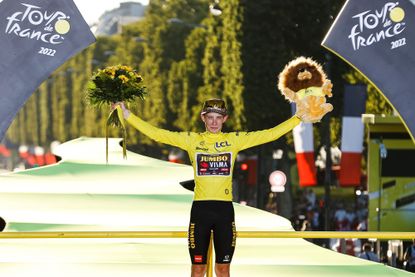
Dates: July 1 to July 23, 2023
Stages: 21
Length: 3,404 km
Grand Départ: Bilbao, Spain
Finish: Paris, France
TV coverage (UK): Discovery+, GCN+, ITV4
TV coverage (US): Peacock, NBC Sports
Tour de France 2023: key information
- Tour de France 2023 route
- How to watch the Tour de France 2023 on TV
- Tour de France 2023 standings
- Tour de France 2023 withdrawals
- Tour de France 2023 start list
- Tour de France 2023 key stages
- Tour de France leader's jerseys
- Tour de France winning bikes
- Tour de France 2022 Stage 20 results
Tour de France 2022: Jonas Vingegaard crowned Tour de France winner as Jasper Philipsen takes final stage win
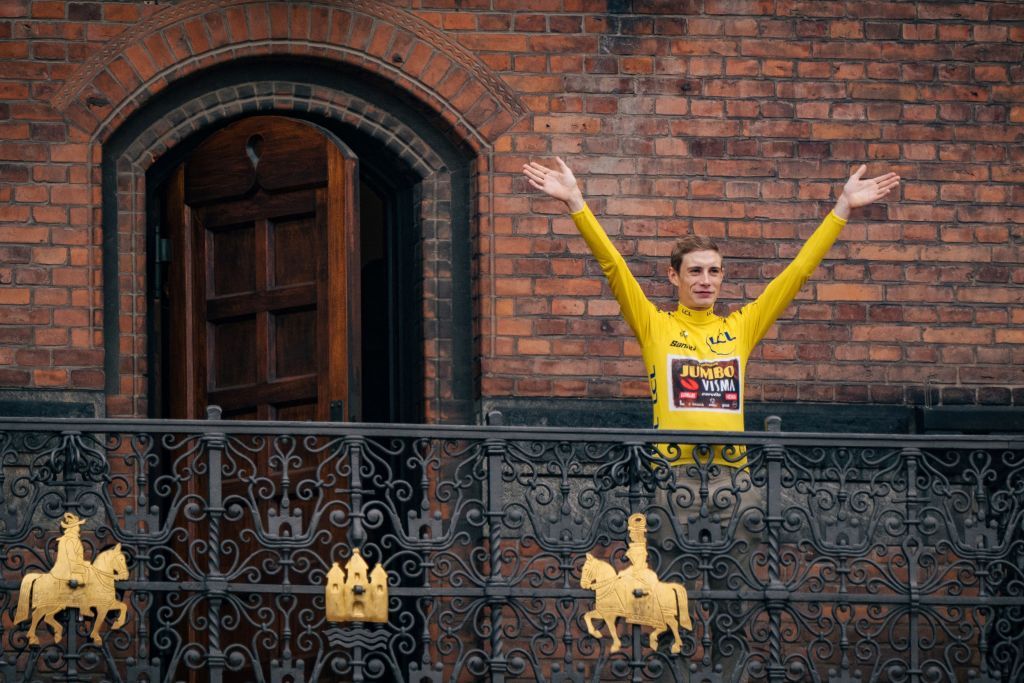
Jonas Vingegaard (Jumbo-Visma) has been crowned Tour de France 2022 champion following the traditional processional final stage into Paris, which was won by Jasper Philipsen (Alpecin-Deceuninck)
As usual, the final stage saw a relaxed peloton sipping Champagne before a frantic few laps around the centre of Paris. Philipsen sprinted to his second win of this year's Tour on the Champs-Élysées ahead of Dylan Groenewegen (BikeExchange-Jayco) and Alexandr Kristoff (Intermarché-Wanty-Gobert Matériaux).
Danish ace Vingegaard finished 2.43 ahead of last year's winner Tadej Pogačar (UAE Team Emirates), with Geraint Thomas (Ineos Grenadiers) third at 7.22.
Pogačar, who would have made it a hat-trick of wins had he been able to defend his title did win the young riders classification, while Vingegaard's Jumbo-Visma team-mate Wout van Aert claimed the green jersey with a record points haul of 480.
Tour de France 2023: Quote of the Day
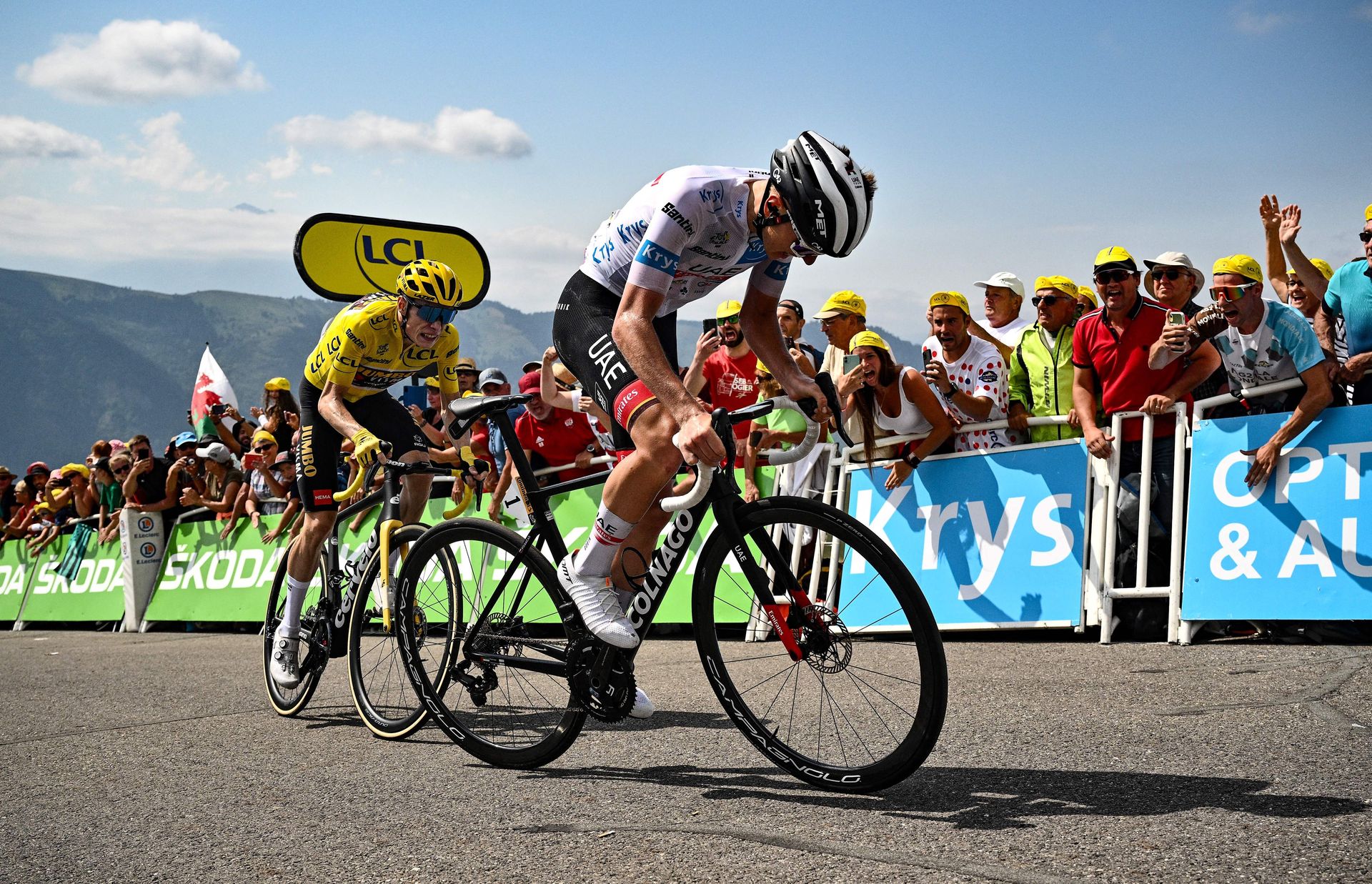
At the route presentation for the 2023 edition of the Tour de France, Tadej Pogačar gave a resounding thumbs up to what he saw.
The 2023 Tour de France route looks like it's one for the climbers, and being one of the best at going uphill in the world, the UAE Team Emirates rider should be licking his lips at the prospect of four summit finishes.
"I really like this course," Pogačar said. "The first week is already hard, and the third week is really, really hard, so it's going to be fun. I cannot wait for July. It's good that the hardest stages come early in the Tour de France, it makes it so much more interesting," he added.
Where will the Tour de France start in 2023?
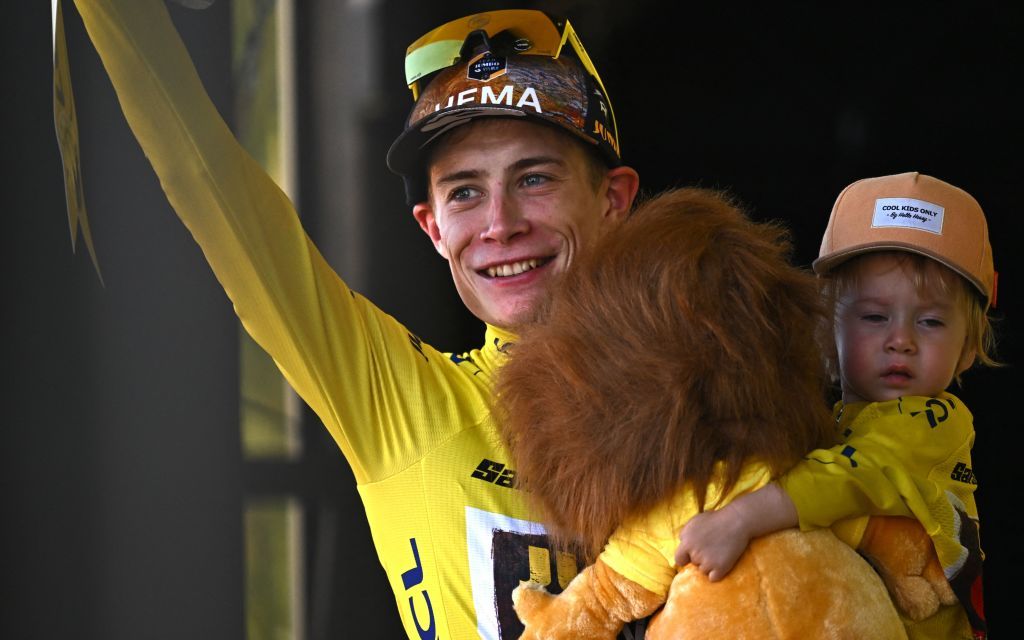
Tour de France 2023 Grand Depart information
Bilbao, Spain
Saturday, July 1
Following this year's hugely successful Grand Départ in Denmark, the Tour de France will once again start away from home soil in 2023. The Tour de France 2023 will kick off in Spain - more specifically in Bilbao, in the country's Basque region.
It'll be the first time the race has started in Spain since 1992, with the first stage a hilly coastal 185km loop.
Day two is a tough 210km from Vitoria-Gasteiz to San Sebastián, while stage three will begin in Amorebieta-Etxano and there will be 80km of coast roads before the Tour re-enters France.
Tour de France jerseys
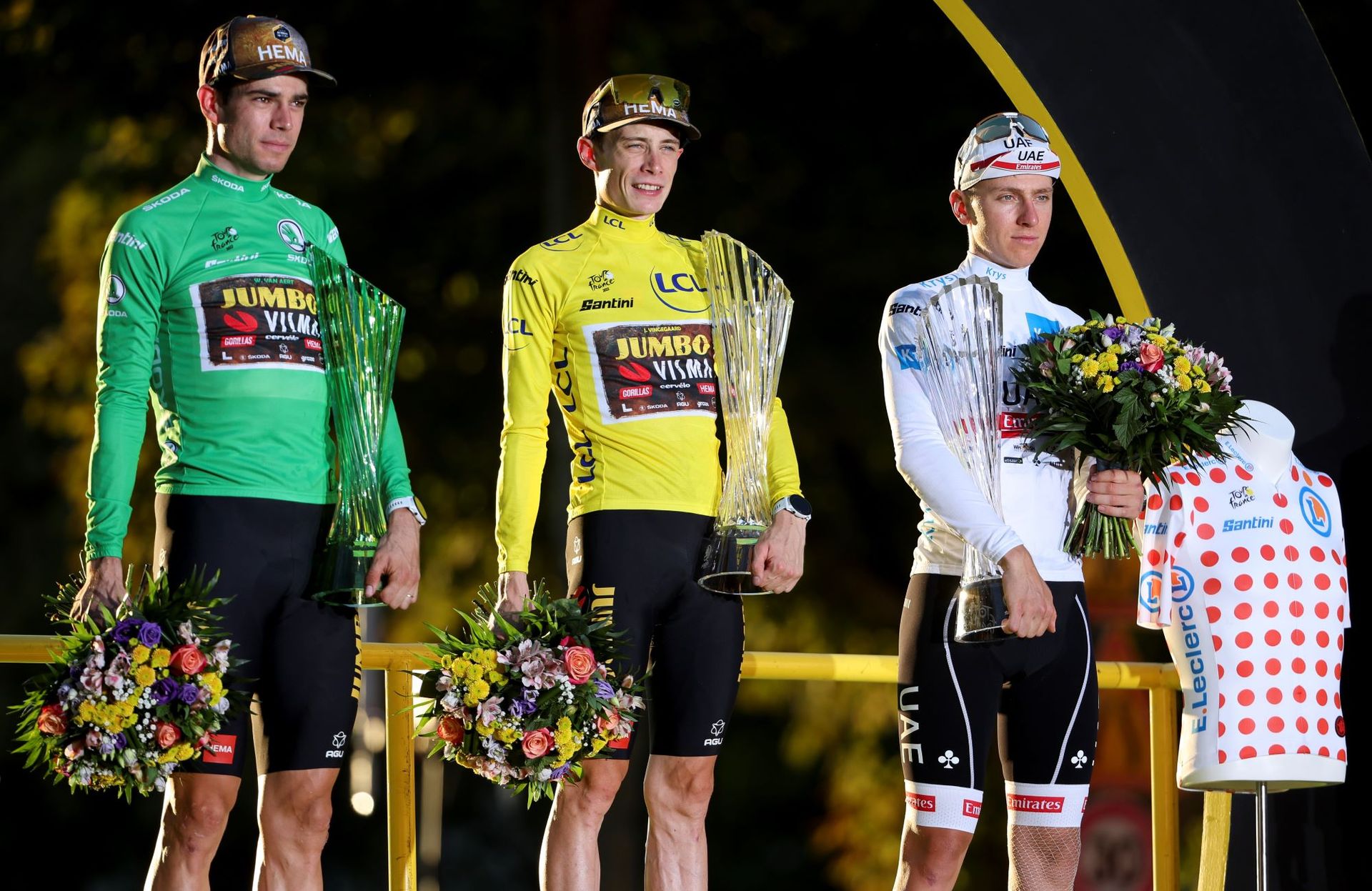
Much like every year in recent memory, the jerseys and classifications are the yellow jersey for the overall leader, green jersey for the leader in the points standings, polka-dot jersey for the mountain classification, and the white jersey for the best young rider.
Along with the jersey prizes, there is an award for the most combative rider of each stage, with the winner wearing a red number on the following day. This is awarded each day with a Super Combativity award decided by a jury at the end of the race for the most active rider throughout the entire event.
There is also a team classification where the time of the first three riders from each team is put together to create a single time. This is then done in a similar way as the individual general classification.
In addition, there are plenty of bonus seconds up for grabs at the race. There are ten, six and four bonus seconds available at the end of each stage for the first three riders, as well as bonus sprints that are dotted throughout the race on key climbs to try and make the racing more entertaining for spectators.
Of course, there's also prize money up for grabs. While the €610,000 (£526,000/$634,000) Tour de France prize money that last year's winner Jonas Vingegaard collected is a tidy sum, it pales in comparison to the wages of many top professional sports stars.
For example Manchester United's Cristiano Ronaldo is said to earn £510,000 ($615,000) a week. And the Portuguese striker doesn't have to share that with his team-mates, something that has often been done by the Tour's individual winner.
Tour de France 2023 teams
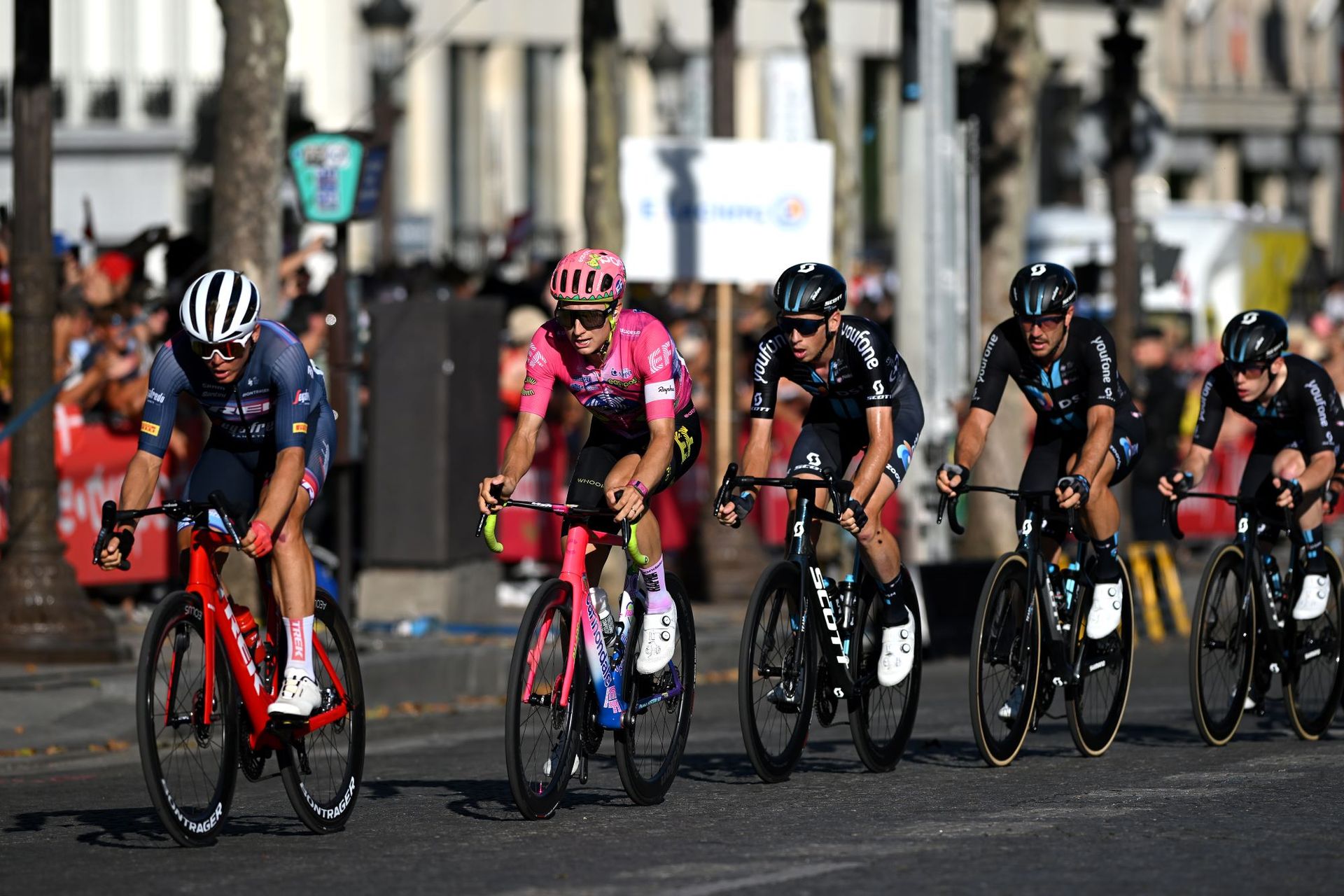
All 18 of the 2022 WorldTour teams will be riding the Tour de France, with four ProTeams joining them to complete the peloton - that brings the total to 22 teams, each fielding eight riders.
However the startlist for the 2023 edition won't begin to materialise until closer to July 2023.
Tour de France 2023 general classification riders
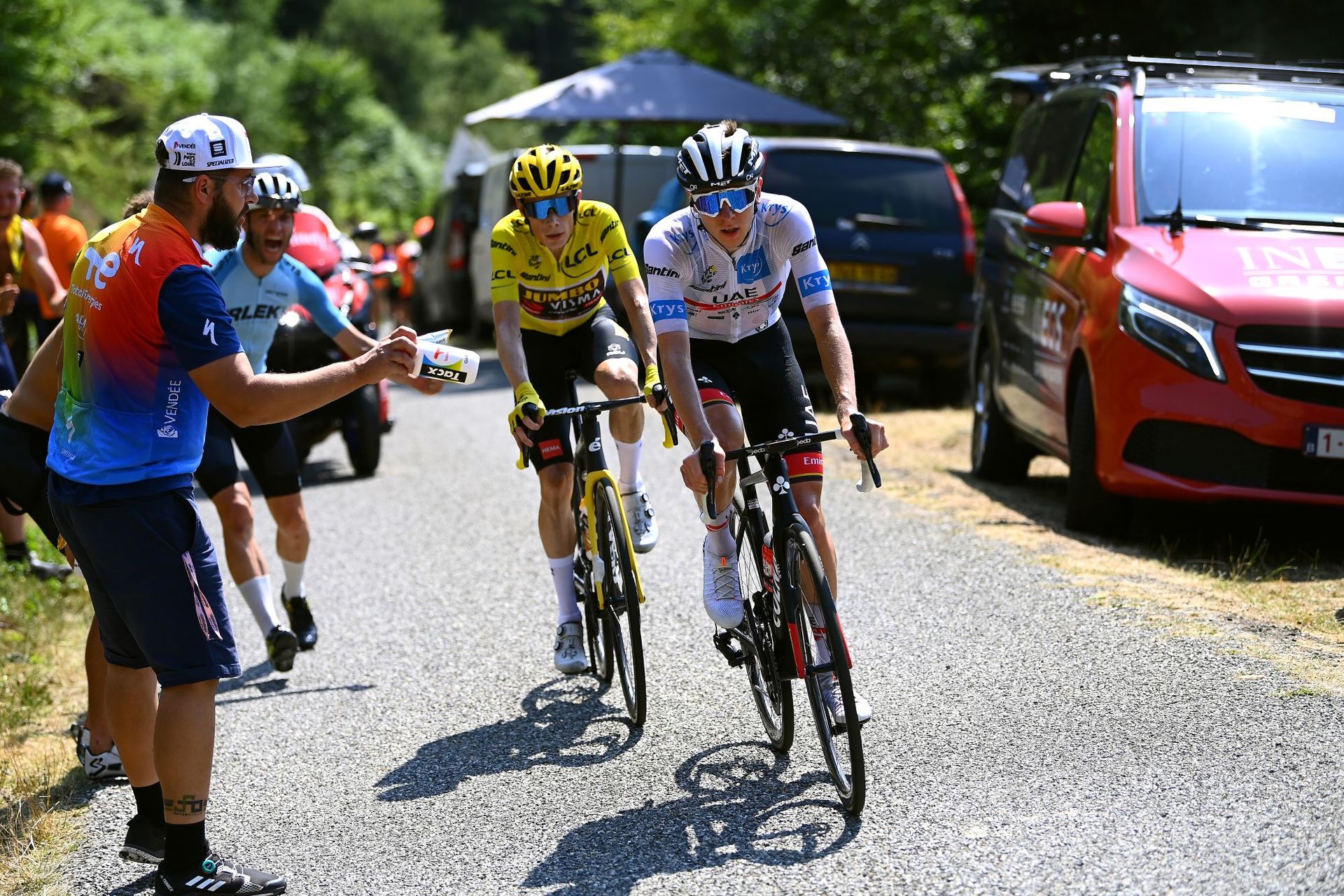
Little is currently known as to which general classification riders will appear on the start line in Bilbao on July 1.
Reigning-champion Jonas Vingegaard will almost certainly make an appearance and said in October that he is "up for the challenge" of defending his title. Meanwhile Tadej Pogačar said that he was already looking forward to next July at the recent route announcement.
The route very much favours climbers such as France's David Gaudu with just 22 kilometres on offer. Remco Evenepoel's team boss Patrick Lefevere said that he feels that the Belgian "can do well on every kind of course,” meaning that he could yet participate in the Tour.
Tour de France 2023 sprinters
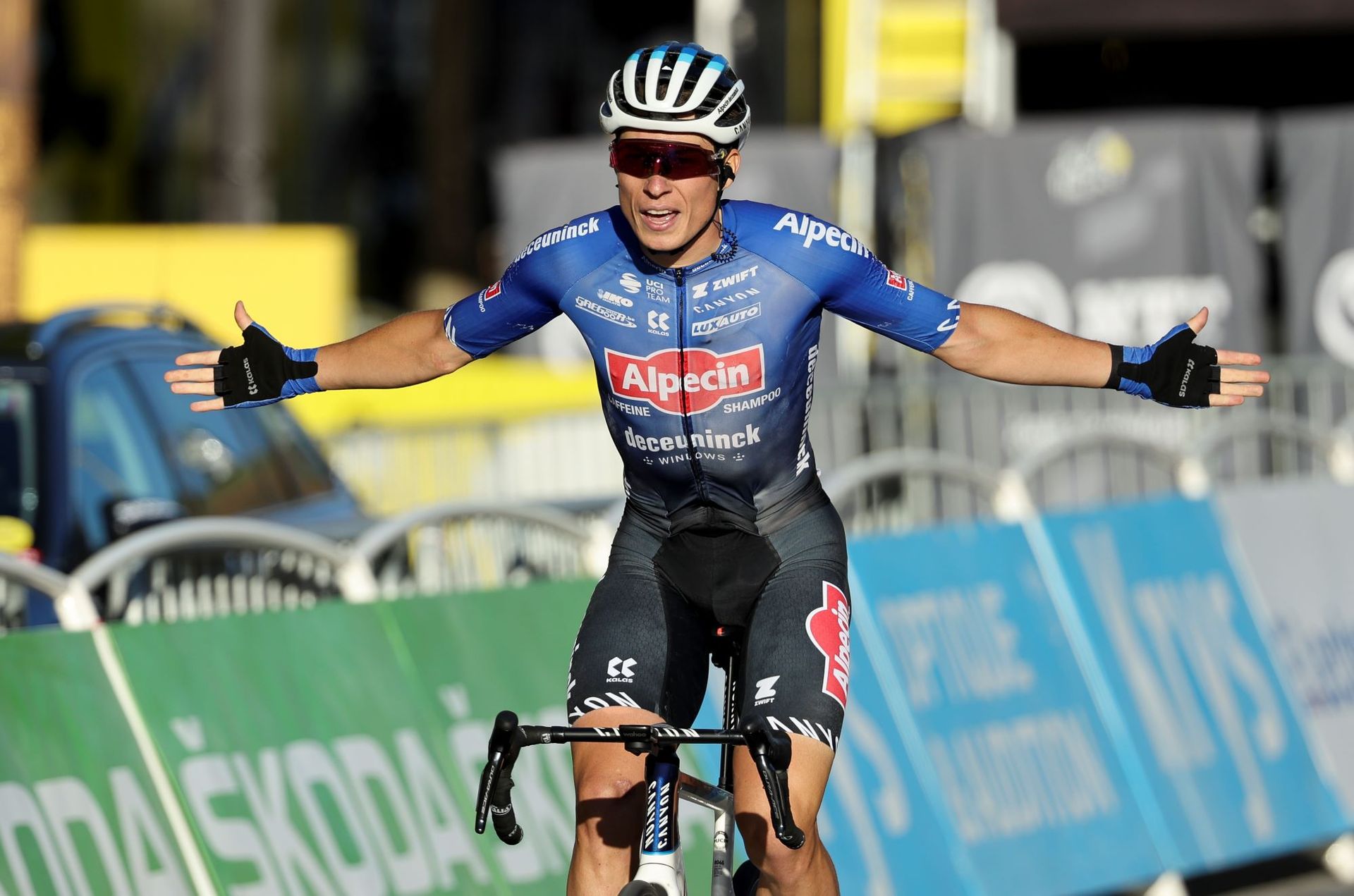
Mark Cavendish wins stage four of the 2021 Tour de France
Jasper Philipsen of Alpecin-Deceuninck was one of the star men of last year's Tour de France, taking victory on the Champs Elysees in Paris. If the Belgian returns to the French grand tour in 2023 then he could mount a serious challenge for the green jersey.
Fabio Jakobsen of Quick-Step Alpha Vinyl was chosen over Mark Cavendish by Quick-Step Alpha Vinyl. It meant that Mark Cavendish didn't have the opportunity to surpass Eddy Merckx's record of 34 stage wins at the Tour de France in 2022.
Nothing is currently known as to whether Mark Cavendish will have a ride next season. The Manx rider is leaving Quick-Step at the end of the current year.
Wout Van Aert won the green jersey in 2022 and will be tough to beat if he returns to the Tour in 2023.
Tour de France 2023 on TV
If you are in the UK then you will be able to watch every stage live from start to finish on Discovery+, GCN+ and ITV4, with each broadcaster offering highlights too. There will be uninterrupted coverage on Eurosport Player online and on the GCN+ app.
In the USA you can catch the race on Peacock and NBC Sports.
Tour de France 2023 route
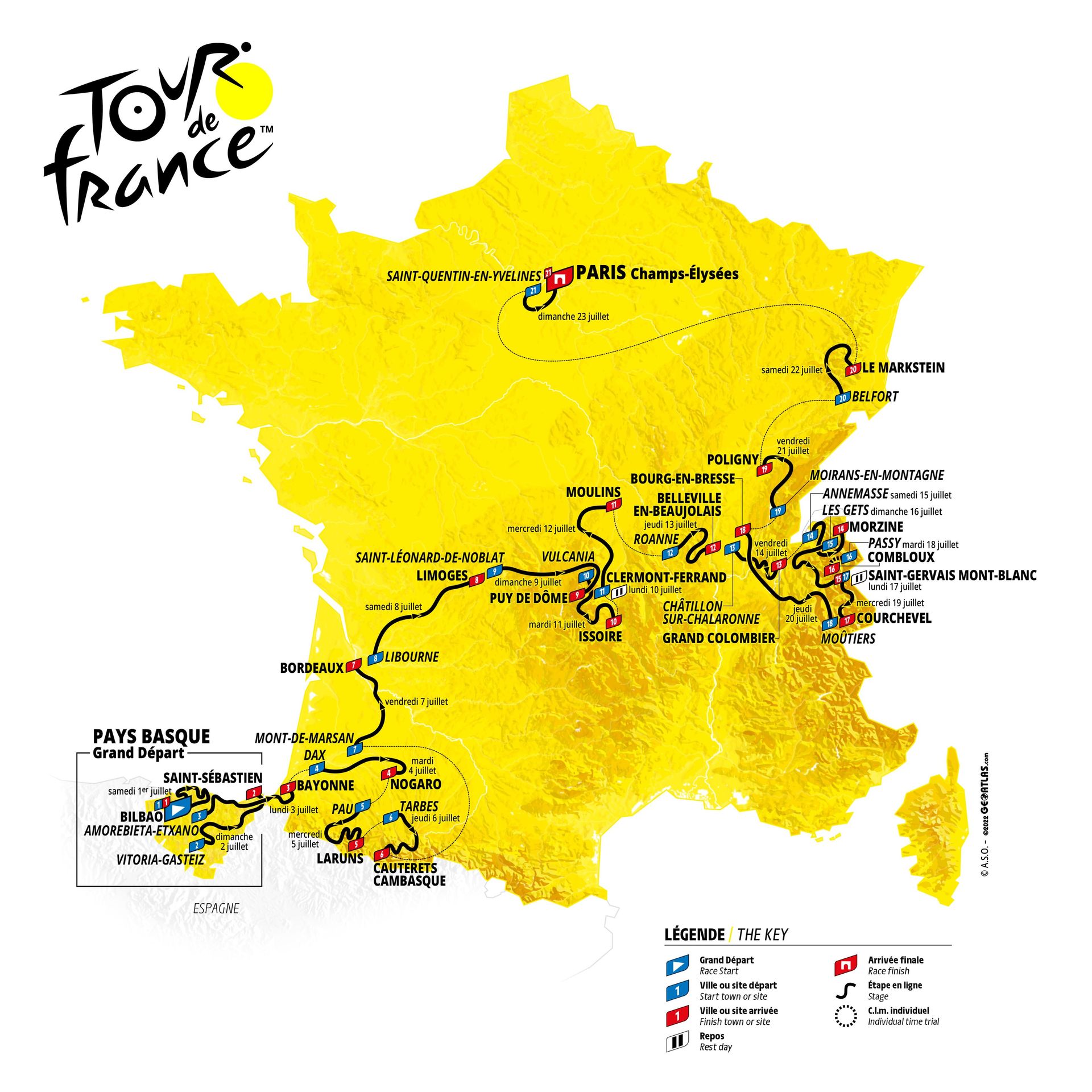
For more information on this year's parcours, head to our Tour de France 2023 route page where you can find all the race profiles and in-depth descriptions.
| Stage | Date | Start | Finish | Distance | Terrain |
| Stage one | 1 July | Bilbao (Spain) | Bilbao (Spain) | 182km | Hilly |
| Stage two | 2 July | Vitoria-Gasteiz (Basque Country) | San-Sebastian (Basque Country) | 209km | Hilly |
| Stage three | 3 July | Amorebieta-Etxano (Basque Country) | Bayonne (France) | 185km | Flat |
| Stage four | 4 July | Dax | Nogaro | 182km | Flat |
| Stage five | 5 July | Pau | Laruns | 165km | Mountain |
| Stage six | 6 July | Tarbes | Cauterets-Cambasque | 145km | Mountain |
| Stage seven | 7 July | Mont-de-Marsan | Bordeaux | 170km | Flat |
| Stage eight | 8 July | Libourne | Limoges | 201km | Hilly |
| Stage nine | 9 July | Saint-Leonard-De-Noblat | Puy de Dome | 184km | Mountain |
| Stage ten | 11 July | Vulcania | Issoire | 167km | Hilly |
| Stage 11 | 12 July | Clermont-Ferrand | Moulins | 180km | Flat |
| Stage 12 | 13 July | Roanne | Belleville-En-Beaujolais | 169km | Hilly |
| Stage 13 | 14 July | Chatillion-Sur-Chalaronne | Grand Colombier | 138km | Mountain |
| Stage 14 | 15 July | Annemasse | Morzine les Portes du Soleil | 152km | Mountain |
| Stage 15 | 16 July | Les Gets les Portes du Soleil | Saint Gervais Mont Blanc | 180km | Mountain |
| Stage 16 | 18 July | Passy | Combloux | 22km | ITT |
| Stage 17 | 19 July | Saint Gervais Mont Blanc | Courchevel | 166km | Mountain |
| Stage 18 | 20 July | Moutiers | Bourg en Bresse | 186km | Hilly |
| Stage 19 | 21 July | Moirans-en-Montagne | Poligny | 173km | Flat |
| Stage 20 | 22 July | Belfort | Le Markstein Fellering | 133km | Mountain |
| Stage 21 | 23 July | Saint Quentin en Yvelines | Paris (Champs-Élysées) | 115km | Flat |
Tour de France past winners in the last 10 years
2012: Bradley Wiggins (GBr)
2013: Chris Froome (GBr)
2014: Vincenzo Nibali (Ita)
2015: Chris Froome (GBr)
2016: Chris Froome (GBr)
2017: Chris Froome (GBr)
2018: Geraint Thomas (GBr)
2019: Egan Bernal (Col)
2020: Tadej Pogačar (Slo)
2021: Tadej Pogačar (Slo)
2022: Jonas Vingegaard (Den)
How does the Tour de France work?
The Tour de France is one of three races that are three weeks long, known as the Grand Tours, alongside the Giro d'Italia and the Vuelta a España. The Tour is the best known and arguably the most prestigious.
It is the second of the three races in the calendar with the Giro taking place in May, the Tour usually in July, and the Vuelta in August and September.
The Tour, like all Grand Tours, takes on varying terrain with flat days for sprinters, hilly days for punchers and mountains for the climbers and GC riders, along with time trials, so that a winner of the race has to be able to perform on all types of road.
The main prize in the race, known as the general classification, is based on time with the overall leader wearing the yellow jersey. The race leader and eventual winner is the rider who has the lowest accumulated time over the 21 days of racing. Riders can win the Tour de France without winning a stage, as Chris Froome did in 2017. Time bonuses of 10, six, and four seconds are given to stage winners though, creating incentive for those general classification riders to chase individual victories and lower their overall time.
In 2020 it took race winner Tadej Pogačar 87-20-05 to complete the race with the second-place rider overall 59 seconds slower. That continues all the way down to the last place rider, which was Roger Kluge (Lotto-Soudal) who finished over six hours behind at a time of 6-07-02.
The white best young rider's jersey is worked out in the same way but only riders under the age of 26 are eligible for the jersey.
The polka-dot mountains jersey and the green points jersey are based on a points system and not time. The only reason time would come into account would be if riders are tied on points, then it would go to who is the best placed in the general classification.
The team classification is based on the general classification times of the first three riders of a team on each stage. The time of those three riders is added up and put onto their team's time, creating a GC list much like in the individual classifications. The leading team get to wear yellow numbers and helmets on each stage.
The final classification available is the combativity prize. This is decided by a race jury or, in more recent years, Twitter. This takes place just before the end of each stage and often goes to a rider from the breakaway who has put in a daring performance or attempted to liven up the stage by attacking. The winner of the combativity award gets to wear a special red race number on the following day's stage.
There is a final prize added to this with the Super Combativity prize being awarded on the podium in Paris. This is decided in a similar fashion to pick out the most aggressive, entertaining, and daring rider of the whole three weeks. Again, usually going to a rider who has featured regularly in the breakaway.
Stage winners do not wear anything special the day after apart from getting a small yellow jersey to stick on their number on their bike, this can be replaced if they win multiple stages.
Teams used to come to the race with nine riders but the UCI, cycling's governing body, decided that nine riders from each team was too dangerous and dropped it to eight, however more teams are riding now riding.
How long is the Tour de France?
The Tour de France takes place over 23 days with 21 of those days race days. The riders get two days of resting; they usually fall on the second and third Monday of the race.
This year's race is 3,328km long, which is 2,068 miles, around the same distance from Washington DC to Las Vegas, or Helsinki to Lisbon.
Road stages can range from anything around 100km to something approaching 250km, sometimes more. This year the shortest road stage is the last stage around the streets of Paris at 108.4km with the longest being 249.1km on stage seven, Vierzon to Le Creusot.
Road stages often take around four to five hours with the longer days sometimes nudging over seven hours.
Time trials are always much shorter. Team time trials have long since gone out of fashion in the world of road racing so individual time trials are the main focus these days.
In 2021 the Tour has two individual time trials for the riders to tackle, one on stage five which is 27.2km long from Changé to Laval, and the second on stage 20 over 30.8km from Libourne to Saint-Emilion.
It is a whole day of coverage for the spectators, but for a rider it is not yet known how long it will take to ride these distances, but it should be around 30-40 minutes.
When does the Tour de France start?
The 2023 Tour de France started on July 1 in Bilbao, Spain, with a road stage. There will be three stages overall in the Spanish basque Country, before heading into France, finishing in Paris three weeks later.
The race returns to its usual slot in the calendar in July, after 2020 featured a delayed event while 2021 was two weeks earlier than usual due to the road cycling, track cycling and mountain biking events in the Olympic Games.
The Tour runs from July 1-24, covering 21 stages.
Latest
-

Tom Boonen invited to test Colnago V4Rs after criticism of Tadej Pogačar's bike
Boonen and fellow ex-pro Dirk de Wolf invited to Italy for a "public conversation" on the data they used to make claim that bike hindered two-time Tour de France champion
By Tom Thewlis • Published
-
-

First glimpse at Netflix's Tour de France documentary shown in teaser trailer
The series, thought to be coming in June, was presented to the audience at the Mobile World Congress on Tuesday
By Adam Becket • Published
-

In celebration of Peter Sagan, cycling's rock and roll frontman
As the three-time world champion is set to call time on his career in the WorldTour at the end of 2023, we thought we would take a look back at the glory days
By Tom Thewlis • Published
-

CW Live: Romain Bardet to lead Team DSM at Tour de France; Mark Cavendish robbery accused 'learning to walk again'; Van der Poel reveals his road racing schedule & Extinction Rebellion plan to target Tour Down Under
All the need to know news in cycling today
By Tom Thewlis • Published
-

‘You never know in the Tour’ - Romain Bardet fearless as he lines up Tour de France GC bid
The 32-year-old is ready to play the tactical game this July
By Tom Davidson • Published
-

Wright on Fire: Fred Wright on his breakthrough year, almost winning, and Primož Roglič
The young Bahrain-Victorious rider is one of the hottest properties in the peloton. All he needs now is a victory.
By Adam Becket • Published
-

‘I just started screaming’: Uno-X team boss delighted with Tour de France wildcard invitation
Jens Haugland said his team will race in a "very positive and attacking" way this July
By Tom Davidson • Published
-

No win for Jonas Vingegaard? Cycling Weekly's bold predictions for the 2023 season
With under a fortnight until the WorldTour kicks off this year, it is time to take a look into our crystal ball
By Adam Becket • Published
-

Speed Demons of the peloton: The six best sprinters of 2022
We take a look at the standout performers of the fast men and women in the professional scene this year
By Tom Thewlis • Published
